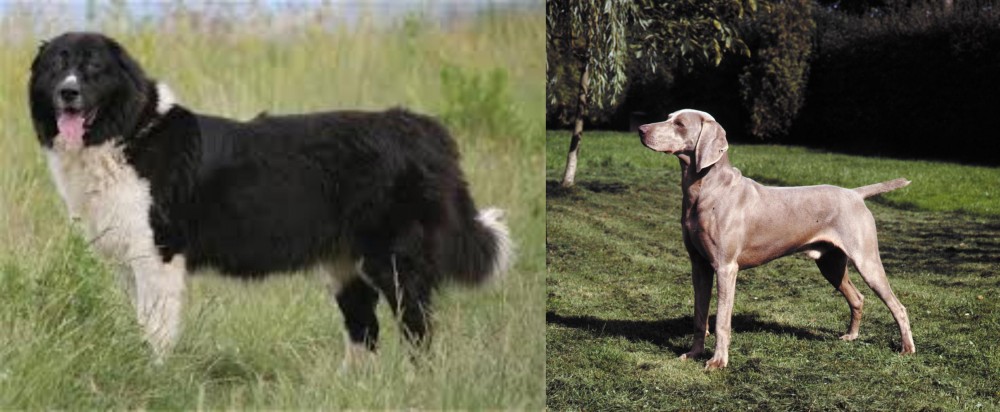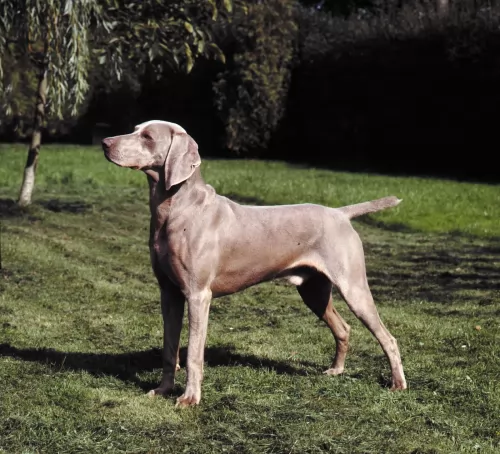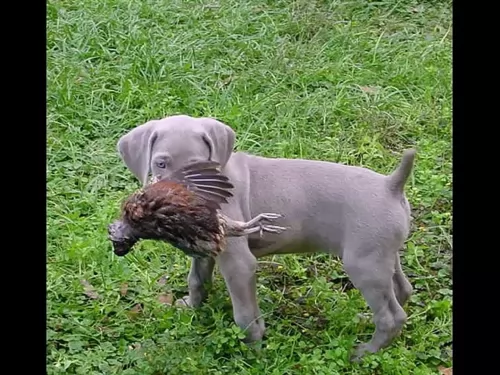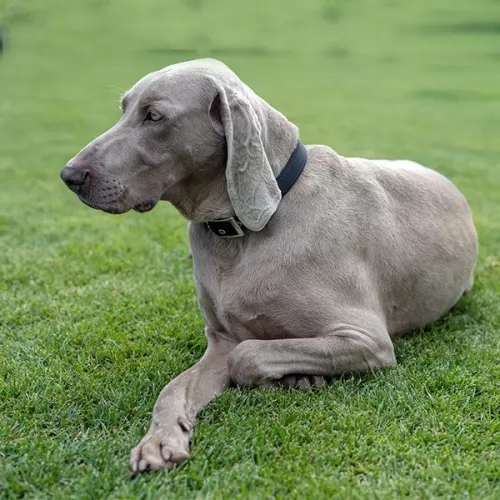 Petzlover
Petzlover Bulgarian Shepherd is originated from Bulgaria but Smooth Haired Weimaraner is originated from Germany. Both Bulgarian Shepherd and Smooth Haired Weimaraner are having almost same height. Bulgarian Shepherd may weigh 17 kg / 38 pounds more than Smooth Haired Weimaraner. Bulgarian Shepherd may live 43 years more than Smooth Haired Weimaraner. Both Bulgarian Shepherd and Smooth Haired Weimaraner has almost same litter size. Bulgarian Shepherd requires Moderate Maintenance. But Smooth Haired Weimaraner requires Low Maintenance
Bulgarian Shepherd is originated from Bulgaria but Smooth Haired Weimaraner is originated from Germany. Both Bulgarian Shepherd and Smooth Haired Weimaraner are having almost same height. Bulgarian Shepherd may weigh 17 kg / 38 pounds more than Smooth Haired Weimaraner. Bulgarian Shepherd may live 43 years more than Smooth Haired Weimaraner. Both Bulgarian Shepherd and Smooth Haired Weimaraner has almost same litter size. Bulgarian Shepherd requires Moderate Maintenance. But Smooth Haired Weimaraner requires Low Maintenance
 The Bulgarian Shepard Dog comes from the ancient line of Molossers of Central Asia and Tibet, and the shepherds of the Balkans, Turkey and Caucasus. Among the oldest and most valued of the working dogs of Europe, the Bulgarian Shepherd breed was created by mixing the Balkan breeds with the dogs from Central Asia by the proto-Bulgarians around the 7th century. The Karakachanskoto Kuche was introduced to Bulgaria and accepted by the sheep herders. Mixing this breed in with the Balkan and Central Asian mix developed the Bulgarian Shepherd we know today. In the long run the original Karakachanskoto Kuche became extinct, replaced entirely by the Bulgarian Shepherd even in places where the new breed is still called by the Kuche name. Although the breeds are not the same, most of the dog world does not know the difference.
The Bulgarian Shepard Dog comes from the ancient line of Molossers of Central Asia and Tibet, and the shepherds of the Balkans, Turkey and Caucasus. Among the oldest and most valued of the working dogs of Europe, the Bulgarian Shepherd breed was created by mixing the Balkan breeds with the dogs from Central Asia by the proto-Bulgarians around the 7th century. The Karakachanskoto Kuche was introduced to Bulgaria and accepted by the sheep herders. Mixing this breed in with the Balkan and Central Asian mix developed the Bulgarian Shepherd we know today. In the long run the original Karakachanskoto Kuche became extinct, replaced entirely by the Bulgarian Shepherd even in places where the new breed is still called by the Kuche name. Although the breeds are not the same, most of the dog world does not know the difference.
In Bulgaria however the Karakachan is a national treasure and the history of the breed runs deep. One Kuche could run up to 1200 animals and hundreds were used by the herdsmen in the mountains of Bulgaria. There were many regional types of Bulgarian Shepherds with very little difference between those types. These dogs were so prized by the shepherds that the dogs ate first before the people. The dogs however ate a vegetarian diet of milk, wheat, water and oats. The Bulgarian Shepherd lives a long life of often over 20 years. The Bulgarian Army made good use of these dogs early in the 20th century.
Following World War II, the wolves were close to extinction and property in Bulgaria was nationalized. There was no longer a need for a large force of working dogs. The Communist government exterminated large numbers of sheep dogs including the Bulgarian Shepherd. Only those species on government owned farms and in remote regions survived. When the government farms were disbanded in the early 20th century, these dogs were exterminated as well. Only those in the mountains survived. Commercial breeding of the Bulgarian Shepherd in the end of the century has resulted in controversy as other breeds came into the breeding program.
Use of breeds such as Sarplaninacs, Caucasian Ovcharkas, St. Bernards, Central Asian Ovcharkas and Bosnian Tornjaks in these programs resulted in Bulgarian Shepherd or Karakachans that were a lot different from the original breed. There is therefore some concern about the future of the breed in Bulgaria, yet they received official Bulgarian national recognition in 2000. Today’s Bulgarian Shepherd is a guard dog for both property and livestock.
The official standard for the breed came about in 1991 and in 2005 it was recognized by the Bulgarian State Commission for Animal Breeds. Only those dogs that meet this standard are considered “true” Karakachans. The Bulgarian Shepherds are willing to fight bears and wolves in defense of its family and flock. The dog is brave and loyal, dignified and powerful. They are recognized by both the Dog Registry of America, Inc. (DRA) and the Bulgarian Republican Federation of Cynology (BRFC) a member of the FCI.
 The Smooth Haired Weimaraner is a beautiful silvery-grey dog that was once bred for hunting way back in the 19th century.
The Smooth Haired Weimaraner is a beautiful silvery-grey dog that was once bred for hunting way back in the 19th century.
He has always been described as an all-purpose gun dog bred from crossing different German and French hunting dogs with the Bloodhound.
History of this dog dates back to 1897. This is when a club was formed in Germany for the breed.
 A massive, powerful and muscular Molosser, the Bulgarian Shepherd is strong, agile, powerful and fast. They are intelligent and reliable. They have a long, thick, harsh coat in white with patches of black. Their skull is massive and broad with a furrowed forehead. The muzzle is massive as well while the nose has wide nostrils and is fairly large. It has close fitting, thick lips with strong, scissor bite jaws. The Bulgarian Shepherd’s eyes are deep, oblique and small. They are either hazel or dark. They have an intelligent and confident, yet firm almost grim expression.
A massive, powerful and muscular Molosser, the Bulgarian Shepherd is strong, agile, powerful and fast. They are intelligent and reliable. They have a long, thick, harsh coat in white with patches of black. Their skull is massive and broad with a furrowed forehead. The muzzle is massive as well while the nose has wide nostrils and is fairly large. It has close fitting, thick lips with strong, scissor bite jaws. The Bulgarian Shepherd’s eyes are deep, oblique and small. They are either hazel or dark. They have an intelligent and confident, yet firm almost grim expression.
Their ears are low set, small and v-shaped. They sit close to the head which sits on a powerful but short neck. They have a broad back, well-muscled body with a deep chest and long, rough tail. Their gait is a trot with a spring in their step. There are two types of coats – longhaired and shorthaired with no undercoats.
 The lean, well muscled Smooth Haired Weimaraner is athletic to look at, brimming with energy and vitality. The coat is smooth and short and is a magnificent steel grey to silver coat which even tends to be a blue-grey color.
The lean, well muscled Smooth Haired Weimaraner is athletic to look at, brimming with energy and vitality. The coat is smooth and short and is a magnificent steel grey to silver coat which even tends to be a blue-grey color.
The short coat makes the dog low maintenance. He is also a low shedding dog. He is a medium to large sized dog standing at between 57 and 70cm in height and weighing in the region of 25 to 40kg.
The tail has always been docked, giving him that distinctive, dignified appearance. The tail then measures about 6 inches in length.
These dogs are also excellent water dogs with their webbed paws. The ears of the dog are medium length and floppy and the eyes are light amber or a blue-grey color.
You just have to look at the Smooth Haired Weimaraner and you can see how he just loves being with his human owner all the time, so much so that he is known for separation anxiety. Sometimes he can become so distraught separated from his owner that he can even injure himself trying to reach his owner. Being separated for too long can cause him anxiety issues.
Certainly this dog is going to need the right kind of training and socialization to calm him. They’re also full of energy too and are going to require a good amount of exercise.
 This is a working dog, intelligent and independent guard dog. Reserved around strangers but loyal and devoted with his family. Tolerant of children in their family if they were raised with them. Not only will she defend human family members, she will guard and defend household pets as well. He is quite capable of making her own independent decisions. These are very intense guard dogs that will respond aggressively if they think their people are being attacked.
This is a working dog, intelligent and independent guard dog. Reserved around strangers but loyal and devoted with his family. Tolerant of children in their family if they were raised with them. Not only will she defend human family members, she will guard and defend household pets as well. He is quite capable of making her own independent decisions. These are very intense guard dogs that will respond aggressively if they think their people are being attacked.
 Your distinctive silvery-grey Weimaraner with his velvety ears and striking eyes is such a loving dog, desiring to be with his human family as much as possible.
Your distinctive silvery-grey Weimaraner with his velvety ears and striking eyes is such a loving dog, desiring to be with his human family as much as possible.
They are also good with children. Their loving nature and eagerness to please will ensure that you have a fully integrated 4 legged family member in your home who wants to be involved with everything you're busy with.
 The breed itself is known to be healthy but they do face some of the usual health issues of the massive, giant breeds. This includes knee and elbow dislocation; hip dysplasia; bloat; entropion and osteosarcoma. All of these conditions require medical intervention, but bloat and osteosarcoma are the deadliest. Bloat needs immediate attention and osteosarcoma is a deadly bone cancer.
The breed itself is known to be healthy but they do face some of the usual health issues of the massive, giant breeds. This includes knee and elbow dislocation; hip dysplasia; bloat; entropion and osteosarcoma. All of these conditions require medical intervention, but bloat and osteosarcoma are the deadliest. Bloat needs immediate attention and osteosarcoma is a deadly bone cancer.
 There are some common dog illnesses that most dog owners fear, and hip dysplasia is one. Fortunately the Orthopedic Foundation for Animals tells us that Weimaraners aren’t prone to this dysplasia the way some dogs are.
There are some common dog illnesses that most dog owners fear, and hip dysplasia is one. Fortunately the Orthopedic Foundation for Animals tells us that Weimaraners aren’t prone to this dysplasia the way some dogs are.
One cause for concern however is bloat, and as a deep chested dog breed, the Short Haired Weimaraner can be prone to this life threatening illness.
Known also as gastric torsion, the stomach swells up and the dog becomes lethargic and restless. Immediate veterinary intervention is required. One way to diminish your dog’s chances of getting bloat is to rather feed him two smaller meals a day as opposed to one large meal.
Also, skin allergies are fairly common with these dogs. If redness appears on the skin or the skin is dry and itchy with a rash and he is losing his hair, you may well need to get your pet to the vet. It is why we always recommend giving your pet some raw meat added to the diet and this can help to prevent skin allergies.
 These are large dogs with large appetites, but you want to keep them lean and active. Feed them at least twice a day with a high quality large or giant dog dry food. Four to five cups of food per day is the maximum.
These are large dogs with large appetites, but you want to keep them lean and active. Feed them at least twice a day with a high quality large or giant dog dry food. Four to five cups of food per day is the maximum.
Patellar Luxation – a floating kneecap or dislocated knee. Will cause lameness.
Osteosarcoma – bone cancer must be treated immediately as it is potentially fatal.
The Bulgarian Shepherd needs a good amount of exercise every day. Remember this is a working breed and they need a job. Long walks every day are essential for his well-being.
 Every dog, especially the Smooth Haired Weimaraner with his anxiety issues, should be trained and socialized, and these dogs are easy to train because they’re intelligent and they want to please.
Every dog, especially the Smooth Haired Weimaraner with his anxiety issues, should be trained and socialized, and these dogs are easy to train because they’re intelligent and they want to please.
The short silvery coat simply requires a good brush-down twice a week to remove the few loose hairs there are. Even if you don’t need to brush him, just do it because of the type of dog the Weimaraner is.
He loves the closeness of owner and dog. It’s a good time to check him over for ticks and fleas, to feel for unusual lumps, to look inside his ears for signs of infection, to check his eyes too, that they’re bright and clear.
If you feed your Smooth Haired Weimaraner commercially manufactured dog food, it needs to be one of the best ones with fairly high protein content. If feeding kibble, you can enhance the food by adding in some tasty home-made food. The Weimaraner’s stomach is easily upset so you want to add in easily digestible home-made food free of exotic spices and richness.
Boiled chicken, brown rice or pasta and spinach, sweet potatoes and carrots is super tasty and nutritious. Your Weimaraner will love such simple, good food and you can add a little to his dry kibble twice a week.
Also important is to add in some raw meat as this ensures a healthy skin. Make sure he has a constant supply of cool, fresh water.